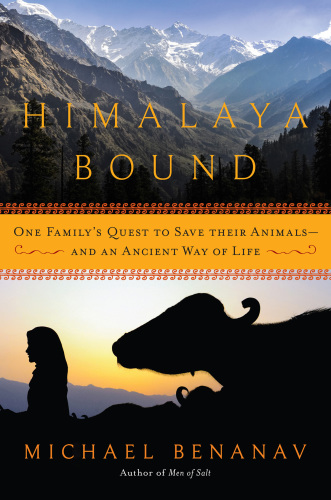
Himalaya Bound
One Family's Quest to Save Their Animals—And an Ancient Way of Life
کتاب های مرتبط
- اطلاعات
- نقد و بررسی
- دیدگاه کاربران
نقد و بررسی

October 15, 2017
A photojournalist and wilderness guide explores tensions between the conservation impulse and the lives of imperiled nomadic herders in this sympathetic but balanced account of their arduous days on the trail. In 2009, Benanav (Men of Salt: Crossing the Sahara on the Caravan of White Gold, 2006) traveled with the Van Gujjars of northern India, a forest-dwelling tribe of water buffalo herders, as they made their seasonal migration from the Shivalik region into the high alpine meadows of the Himalayas. Sharing the simple pleasures and hardships of an extended family, the author came to understand how pressure to abandon their wild grazing lands and freedom for sedentary lives in villages threatens the tribe's existence. That Benanav is drawn to nomadic peoples is clear, as are his sympathies, but this does not prevent him from investigating complex ethical and environmental issues pitting forest department and national park officials against the traditions of nomads whose stewardship of the contested lands may hold a key to their survival. He compares the Van Gujjars' dilemma to that of peoples displaced worldwide, including those forced to move during the creation of some American national parks. Benanav also reveals a surprisingly egalitarian and tolerant Muslim subculture whose greatest concern is for their animals and how the very publicity supporting their cause has opened them to approaches by Islamic fundamentalists. The author maintains a straightforward journalistic tone, keeping his emotions largely in check but calling out the more abusive forest department figures for disregarding laws ensuring nomadic rights. On three return visits over the subsequent years, he saw progress, yet the conflicts remain unresolved. Benanav's avoidance of excess description makes his occasional passages of evocative language all the more powerful. In the end, his portrait of the land and its little-known nomads is impressively closely observed. An involving, often touching story of an admirable people as well as a cautionary tale about the effects of rapid change and counterproductive conservation efforts on traditional societies.
COPYRIGHT(2017) Kirkus Reviews, ALL RIGHTS RESERVED.

November 1, 2017
The numbers alone are astounding: one extended family of 25 climbing 11,000 feet over 125 miles in 40 days with 83 water buffaloes and a few horses, bulls, and dogs. The Van Gujjars complete this trek twice a year from their winter home in the jungles in Uttarakhand, India, to their summer grazing lands in the foothills of the Himalayas. When Benanav (Men of Salt) joined the immensely hospitable Van Gujjars for this migration, the difference was the threat from government agencies that they would not be able to access their ancestral grazing lands owing to environmental concerns for National Parks. Benanav expressively shares the social customs, norms and everyday struggles the Van Gujjars face from intricate marriages with implications across villages, timing travel to maximum fodder available, tending to a calf with an open leg fracture, and most nerve-racking of all, dealing with devious government bureaucracies to continue their way of life. As much an armchair adventure as a philosophical reflection on environmentalism, national parks, and their often unstated impact. No matter one's views on these topics coming into this account, readers will reexamine their thoughts and beliefs throughout. VERDICT A wide variety of readers will enjoy this insightful and absorbing work.--Zebulin Evelhoch, Central Washington Univ. Lib., EllensburgU.S.-China relations, editing as an invisible art, curating royal bloodlines & political dynastiesprofessional media
Copyright 2017 Library Journal, LLC Used with permission.

























دیدگاه کاربران